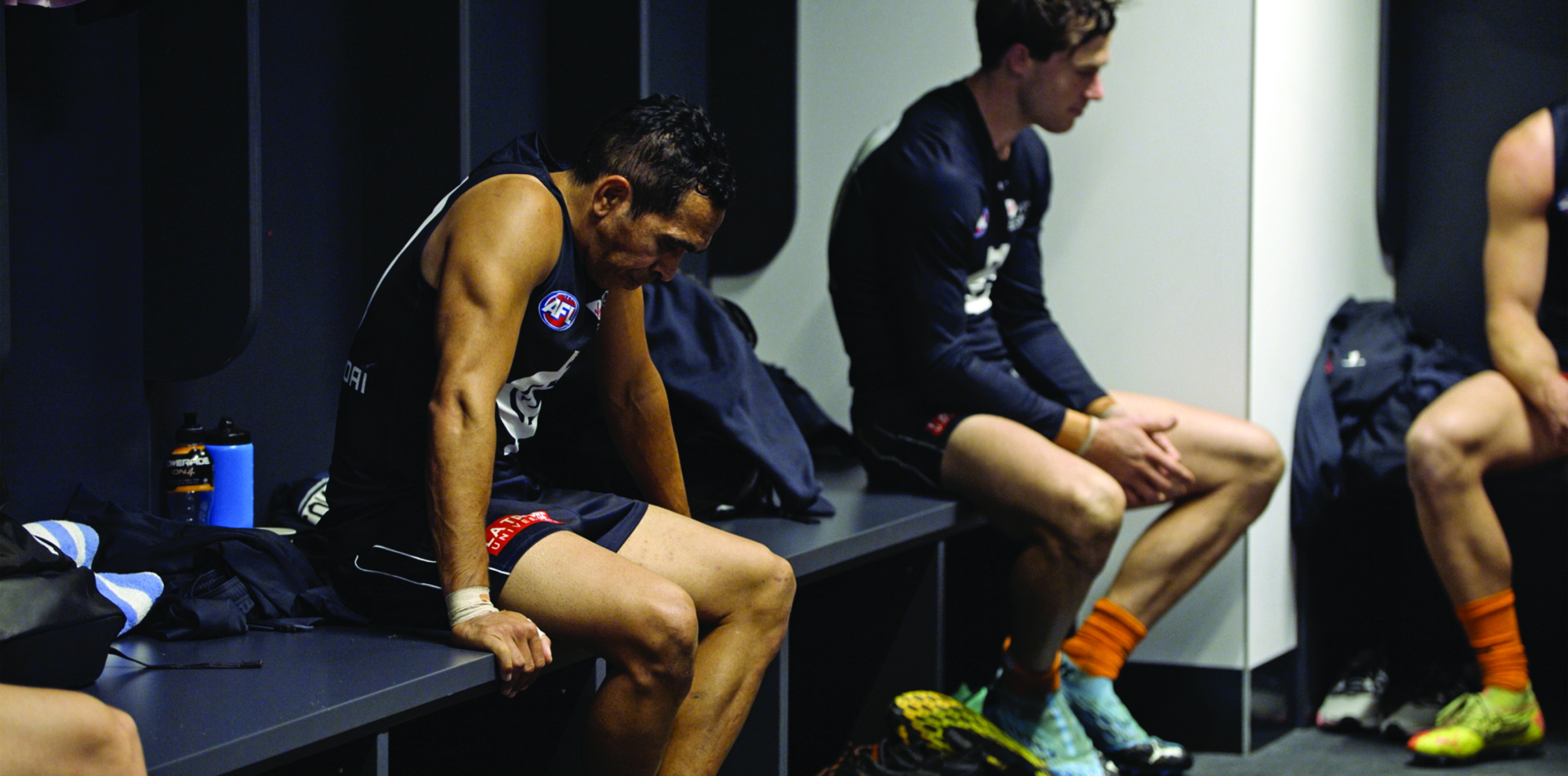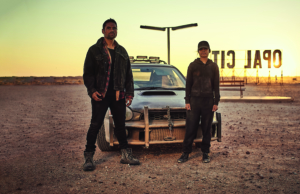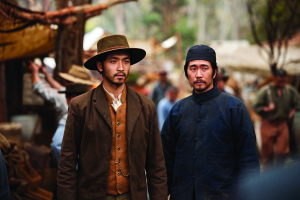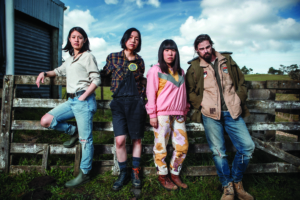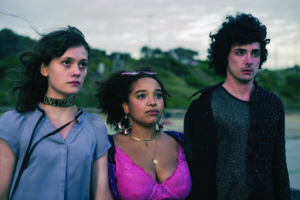By the time the World Health Organization declared a pandemic on 11 March 2020, practically every major sporting league in the world had made the sensible decision to shut down. But ‘footy will find a way’, declared Gillon McLachlan, the CEO of the Australian Football League (AFL), as he announced the following week that the opening round of the season would go ahead.[1]For McLachlan’s full remarks, see ‘AFL CEO Gillon McLachlan’s Full Statement on 17-game Season’, AFL.com.au, 16 March 2020, <https://www.afl.com.au/news/385939/afl-ceo-gillon-mclachlans-full-statement-on-17-game-season>, accessed 13 May 2021. And so it did, but with a strange new look and feel. The Melbourne Cricket Ground, which normally attracts upwards of 70,000 spectators for the first fixture, was empty, allowing every kick, shout and grunt to be heard on TV with awkward clarity. Players tackled, collided and dove on top of one another, but would bump fists or elbows after a goal – when they remembered to do so. A post-match interview conducted at a hygienic distance between reporter and player would end with a lapse in concentration from both parties, as the pair stepped in to shake hands just like old times.
These scenes didn’t exactly instil confidence at a time when everybody and everything seemed contagious, and when public opinion about the threat of the virus ranged from dangerously blasé to dangerously paranoid (the fact that people felt fit to hold an opinion about a virus was alarming in itself).[2]See Bryan Lufkin, ‘Coronavirus: The Psychology of Panic-buying’, BBC Worklife, 5 March 2020, <https://www.bbc.com/worklife/article/20200304-coronavirus-covid-19-update-why-people-are-stockpiling>, accessed 18 May 2021. Persisting with football in this context seemed like a particularly stupid idea, one that risked upholding a facade of business as usual when things were anything but. Footy did find a way, like McLachlan said, for three more days only. With infection cases rising and a nationwide lockdown imminent, the AFL was forced to pull the plug on the season almost as soon as it had begun.[3]See ‘The AFL Has Suspended Matches Due to Coronavirus. What Does That Mean for the 2020 Season?’, ABC News, 22 March 2020, <https://www.abc.net.au/news/2020-03-22/afl-suspends-2020-season-over-coronavirus-will-it-be-cancelled/12079682>, accessed 18 May 2021. But, true to form, footy found a way once more. With the situation improving in Australia and some deft planning on part of the organisers, the competition was able to resume just a couple of months later.[4]The resumed AFL season revolved around flexible fixtures that could be quickly adjusted according to changes in government travel restrictions, along with the introduction of a system whereby teams would take turns relocating to quarantine ‘hubs’ set up, at various points of the season, in New South Wales, South Australia, Western Australia and Queensland. The Richmond Tigers went on to become premiers; my own beloved West Coast Eagles finished fifth.
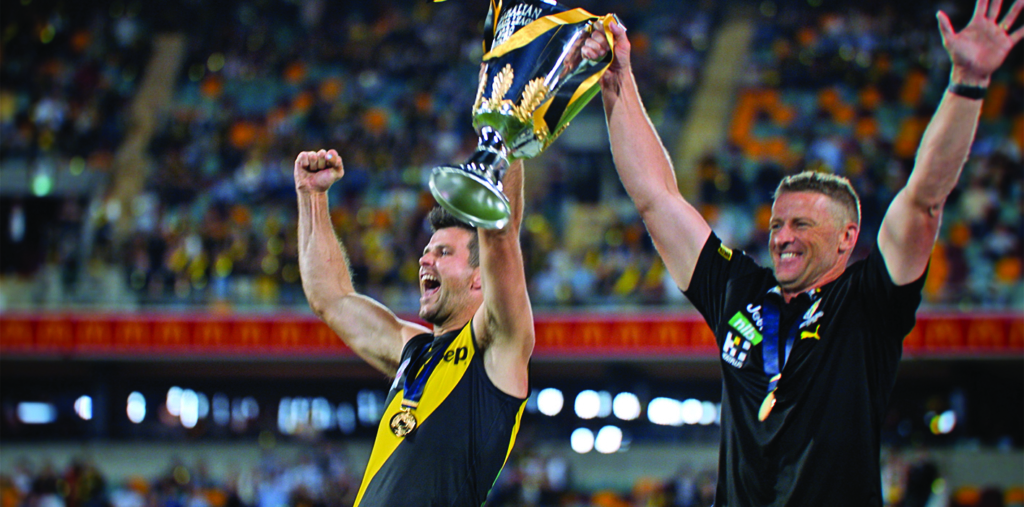
It’s only through good fortune that we’re even able to look back at such a tumultuous year through the prism of football. But good fortune is what most Australians got – as too did the producers of Amazon Prime’s Making Their Mark, who were able to complete their documentary series about the 2020 AFL season and release it to a ready-made, footy-hungry audience. Across seven roughly hour-long episodes, Making Their Mark charts the season through the perspectives of six clubs, from each of which the experience of an individual player or senior coach is highlighted. There’s Carlton Blues veteran and fan favourite Eddie Betts, recently traded back to the club after a seven-year stint with the Adelaide Crows; newly appointed Crows captain Rory Sloane, an earnest midfielder who works his arse off to help get his struggling team back on track; affable Gold Coast Suns coach Stuart Dew, in his third year at the helm of the league’s youngest squad; dreadlocked West Coast superstar Nic Naitanui, fresh from returning from a long-term injury and a crucial member of a side that many pundits expected to prevail in 2020; and young Greater Western Sydney Giants captain Stephen Coniglio, whose desire to make amends for his team’s humiliation in the previous year’s grand final[5]Richmond won the 2019 premiership decider by 89 points, the third-biggest grand final winning margin in the league’s history. becomes waylaid by a mysterious form slump. The Tigers, who inflicted said humiliation, are the exception to this pattern. The focus here rests on coach Damien Hardwick, but also on club president Peggy O’Neal and CEO Brendon Gale, two wise heads whose off-field endeavours provide some of the series’ most interesting insights.
A fly-on-the-wall documentary about six middle-of-the-road teams probably wouldn’t make great viewing for fans and non-fans alike, so it’s fortunate that the producers took an educated punt and dispatched their flies to the right walls. They hit the veritable jackpot with three of the six clubs. Richmond became premiers for the third time in four years, despite a number of scandals that risked derailing their season, while Adelaide won the ‘wooden spoon’ (which is to say they finished dead last). Greater Western Sydney turned out to be very much an average side in 2020, but the club’s decline, and in particular that of its captain Coniglio, ended up being one of the biggest talking points of the season. Carlton, West Coast and, to a lesser extent, Gold Coast, all performed below expectations, but their underwhelming seasons are easily offset by the engaging characters that were chosen to represent them. It’s impossible to know just how much of an impact COVID-19 had on the performances of teams and individuals, just as it is impossible to know how the season might have played out in a virus-free year; in any event, after the first couple of episodes of Making Their Mark show in some detail how the competition was suspended and then resumed, the pandemic more or less recedes into the background. Thereafter, the series for the most part concentrates on the kinds of things that transpire in any ordinary AFL season – matches being won and lost, the struggles of players and coaches, the occasional off-field controversy – while providing a glimpse into the inner workings of the six chosen clubs.[6]Although its scope is much wider, Making Their Mark’s focus on the trials and tribulations of teams within the course of a single season is in line with previous AFL documentaries such as Year of the Dogs (Michael Cordell, 1997) and Collingwood: From the Inside Out (Josh Cable & Marcus Cobbledick, 2019).
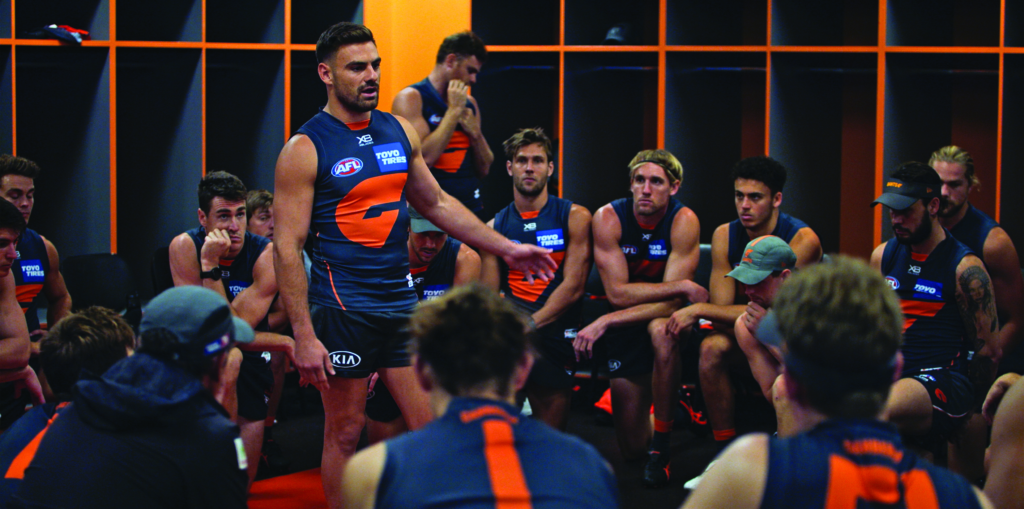
Director Gil Marsden describes Making Their Mark as a ‘truly warts-and-all’ documentary,[7]Gil Marsden, in ‘Making Their Mark Director Gil Marsden (11.03.21)’, radio interview, Whateley, 11 March 2021, available at <https://www.sen.com.au/programs/whateley/>, accessed 18 May 2021. and there are certainly some warts on display. Coniglio is shown to be a supremely dedicated athlete, but also a timid and unconvincing leader who isn’t yet ready for the captaincy role he’s been handed. The added pressures of living and playing in a quarantine bubble seem to overwhelm him, culminating in coach Leon Cameron (who emerges as a stern, old-school figure, unafraid to put his players in their place) taking the drastic decision to drop him from the side, the first time such a thing has happened to a full-time AFL captain in twenty-two years.[8]See Tom Morris, ‘Giants Guarantee Axed Star Will Remain Captain … Even Though He’s Not in the Best 22’, Fox Sports, 15 September 2020, <https://www.foxsports.com.au/afl/afl-2020-stephen-coniglio-dropped-gws-giants-captain-in-2021-giants-trade-news-contracts/news-story/64cad39e5d933f62128803e084a9b342>, accessed 18 May 2021. Elsewhere, Hardwick’s ham-fisted response to a journalist’s questions about a changing-room groping scandal is particularly unflattering, while due screen time is given to Gale mopping up after an incident in which two Richmond players snuck out of quarantine to visit a strip club and then became embroiled in a drunken brawl.[9]See Tyson Otto, ‘AFL 2020: Richmond’s Sydney Stack and Callum Coleman-Jones Banned for 10 Games’, News.com.au, 4 September 2020, <https://www.news.com.au/sport/afl/afl-2020-two-richmond-players-in-brawl-at-gold-coast-strip-club/news-story/994fe362f2a11f3af17348a09c47f932>, accessed 18 May 2021. As can be expected, there are some notable omissions. Carlton had its own changing-room groping scandal, which escapes mention – perhaps because the inclusion of a second similar incident would’ve risked painting all football teams as a bunch of perverts, but more likely because the individual who was groped in this instance wasn’t a fellow player but one of Making Their Mark’s own camera operators.[10]For more on the Carlton incident, see Daniel Cherny, ‘“Unacceptable”: Carlton Apologise After Gibbons Touches Cameraman’, The Age, 23 August 2020, <https://www.theage.com.au/sport/afl/unacceptable-carlton-apologise-after-gibbons-touches-cameraman-20200823-p55oew.html>; for the Richmond scandal, see Jon Pierik, ‘Tigers Apologise After Groping Accusation, Saint Also Sorry for Separate Incident’, The Age, 7 August 2020, <https://www.theage.com.au/sport/afl/tigers-accused-of-groping-teammate-20200807-p55jkb.html>, both accessed 13 May 2021. The series also remains tight-lipped about an infamous Crows training camp from the 2018 preseason that led to an exodus of players and staff over the next two years. Major revelations about this camp came to light during the 2020 season, but are acknowledged only by a caption referring to an ‘off-field controversy’ and a vague insinuation made by Betts, who was one of the departing players in question.[11]Anecdotes about the camp, which was run by a consultancy group called Collective Mind, detailed players being subject to military-style drills and psychological abuse, as well as partaking in rituals involving the culturally offensive use of Indigenous artefacts. For an account of what allegedly occurred, see Sam McClure, ‘Inside the Camp That Brought Down the Adelaide Crows’, The Age, 4 July 2020, <https://www.theage.com.au/sport/afl/inside-the-camp-that-brought-down-the-adelaide-crows-20200630-p557od.html>, accessed 13 May 2021.
The AFL of 2020 appears to be a progressive, culturally inclusive organisation that wants to let the country know it has learned from its past mistakes. Time will tell if this is really the case.
Such omissions are justifiable given the amount of ground the series needed to cover. Other than prompting a raised eyebrow here and there, nobody comes across that badly. In fact, Making Their Mark has been recognised as a mutually beneficial project for most of the parties involved – not the least of which is the AFL itself. The league has been quite transparent about the commercial benefits of participating in the documentary,[12]The AFL’s Kylie Rogers, who holds the unwieldy title of executive general manager customer and commercial, suggests that Amazon can help the league meet consumer demand for ‘sports-tainment’, and describes Making Their Mark as a ‘wonderful partnership’ with the company. See Zanda Wilson, ‘Amazon Prime’s Tyler Bern Unpacks the Platform’s Aussie Sport Strategy Ahead of New AFL Docuseries’, Mumbrella, 9 March 2021, <https://mumbrella.com.au/amazon-primes-tyler-bern-unpacks-the-platforms-aussie-sport-strategy-ahead-of-new-afl-docuseries-672474>, accessed 13 May 2021. and has actively promoted it by drip-feeding fans with sneak previews, articles and extra content, before and since its release. Moreover, Making Their Mark offers the AFL a valuable platform to promote its achievement in running a successful season during a pandemic, as well as to mend the reputational damage it suffered from a recent, major controversy. As depicted in the documentaries The Final Quarter (Ian Darling, 2019) and The Australian Dream (Daniel Gordon, 2019), the AFL had been spineless in their reluctance to call out the racism that Adnyamathanha and Narungga ex–Sydney Swans champion Adam Goodes endured during the final years of his career, only offering a belated apology for its failures before the imminent release of these two films.[13]For more on these two films and the Goodes racism controversy, see Kenta McGrath, ‘Front and Centre: Two Documentaries About Adam Goodes’, 4:3, 1 November 2019, <https://fourthreefilm.com/2019/11/front-and-centre-two-documentaries-about-adam-goodes/>, accessed 13 May 2021; and Travis Johnson, ‘A Race to the Goal: Adam Goodes’ Story in The Final Quarter and The Australian Dream’, Metro, no. 203, 2020, pp. 76–83. To read the AFL’s apology, see Sarah Black, ‘AFL, Clubs Unreservedly Apologise to Goodes For Not “Standing With Him”’, AFL.com.au, 7 June 2019, <https://www.afl.com.au/news/77460/afl-clubs-unreservedly-apologise-to-goodes-for-not-standing-with-him>, accessed 13 May 2021. Making Their Mark, on the other hand, shows an AFL embracing Indigenous cultures, expressing support for the Black Lives Matter movement and acting on the front foot when racist incidents invariably occur (McLachlan is quick to phone Betts and offer his support when the latter becomes the victim of racial abuse online). The AFL of 2020 appears to be a progressive, culturally inclusive organisation that wants to let the country know it has learned from its past mistakes. Time will tell if this is really the case; suffice it to say that nobody stands to benefit from Making Their Mark more than the AFL does.[14]It would have been fascinating had the filmmakers chosen to focus on the Collingwood Magpies, a club that was yet again at the centre of a racism controversy when ex-player Héritier Lumumba’s long-running accusations of racist behaviour and a culture of denial forced it to commission an independent review, headed by academics Larissa Behrendt and Lindon Coombes. The resulting report, which was leaked in February 2021, found a problem of structural systemic racism at the club; as with the Goodes controversy, the AFL’s response was subsequently called into question. See Oliver Caffrey, ‘“Shameful”: Lumumba Hits Back in AFL Racism Row’, The New Daily, 8 February 2021, <https://thenewdaily.com.au/news/national/2021/02/08/lumumba-collingwood-racism/>, accessed 19 May 2021.
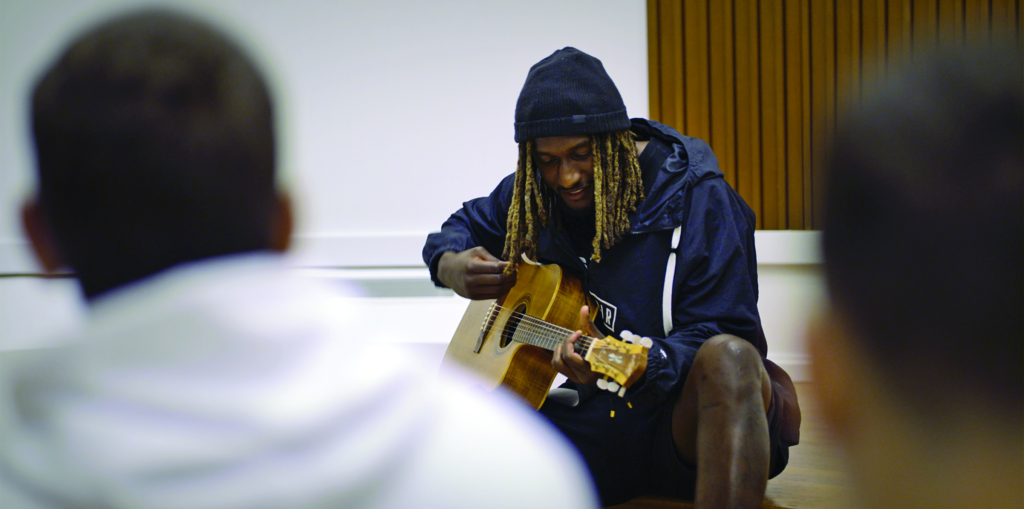
As one might expect from a documentary that was shot over seven months by six separate film crews spread out over the country, Making Their Mark feels less like a work that has been directed than one that has been carried out according to a set of instructions. The observational format is ideal for such a situation, because there’s much less need to be precise compared to when making other types of documentaries; getting the footage is almost always more important than how the footage is filmed. This makes it easier for crews to work independently without the director being physically present, so long as some basic stylistic and ethical guidelines for filming have been established. The editors of Making Their Mark (no fewer than nine are credited) have done a remarkable job in shaping a coherent narrative from this footage – amounting to either 1700 or 2500 hours in total, depending on the source[15]The former figure is provided by Marsden and the latter by co–executive producer Luke Tunnecliffe. See Marsden, op. cit., and Luke Tunnecliffe, ‘Making Their Mark Executive Producer Luke Tunnecliffe on Dwayne’s World’, radio interview, SEN Afternoons, 11 March 2021, available at <https://player.whooshkaa.com/episode?id=800596>, accessed 13 May 2021. – while mapping out the key events of the season and allowing the players’ and coaches’ personalities to be clearly articulated.
Marsden suggests the series contains ‘not a single sit-down interview’,[16]Gil Marsden, quoted in Debi Enker, ‘Bubbles, Hubs and Isolation: A Chronicle of an AFL Season Like No Other’, The Sydney Morning Herald, 9 March 2021, <https://www.smh.com.au/culture/tv-and-radio/bubbles-hubs-and-isolation-a-chronicle-of-an-afl-season-like-no-other-20210305-p5786n.html>, accessed 18 May 2021. which is true insofar as nobody has been asked to sit down in a formal setting and respond to a series of prepared questions. Otherwise, Making Their Mark is full of interviews. They appear in the guise of impromptu chats with players in their homes, cars, gyms and changing rooms; coaches responding to unheard off-screen prompts so that some detail can be clarified for the audience; and grabs of dialogue used as voiceovers to structure many sequences, all of which can be considered interviews in everything but appearance (or, in the latter case, the lack thereof). My earlier remark about the series being a ‘fly-on-the-wall’ documentary needs some qualification here. Although Making Their Mark can be comfortably classified as an observational documentary, it’s of the sort that makes liberal use of observational footage to construct scenes in a similar fashion to most fiction films – that is, by regularly cutting between a variety of angles whose number far exceeds the number of cameras that were used to film the scene. It’s not so much a ‘fly-on-the-wall’ scenario as it is several flies on multiple walls in the same room, multiplied by six – or, at least, this is the impression that the editing creates. This fragmented style of coverage is hardly unusual in contemporary documentary practice, and here it helps the narrative move along at a swift pace while allowing lengthy conversations, discussions and meetings (of which there are many) to be boiled down to their essentials. This approach, however, makes what would’ve already been a dialogue-heavy documentary even more so; crucially, it also undermines the clarity of the words that are spoken.
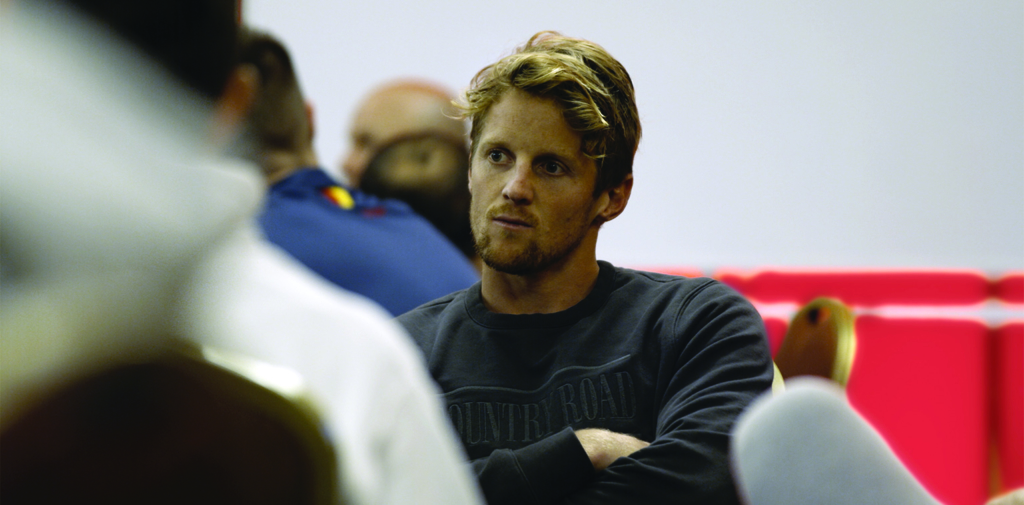
Making Their Mark has been praised for capturing ‘unguarded moments’,[17]Greg Baum, ‘“You Feel Like This Monster of a Person”: Unguarded Moments Caught by Amazon’s Fly on the Wall’, The Age, 9 March 2021, <https://www.theage.com.au/sport/afl/no-flyspray-allowed-for-fly-on-the-wall-doco-20210309-p5796l.html>, accessed 18 May 2021. offering viewers a ‘box-seat behind the scenes’[18]Enker, op. cit. and providing ‘genuine insight into the faults and fears of modern professional athletes’.[19]Dean Bilton, ‘Making Their Mark, Amazon’s AFL Documentary, Offers Genuine Insight into the Faults and Fears of Modern Professional Athletes’, ABC News, 16 March 2021, <https://www.abc.net.au/news/2021-03-16/making-their-mark-afl-amazon-documentary-connection/100013396>, accessed 18 May 2021. Few have remarked on what it actually reveals about how a game of AFL football is won or lost. For all the access granted to the filmmakers – locker rooms, team meetings, performance reviews, coaches’ boxes, sweaty team huddles – Making Their Mark is surprisingly lacking in tactical insight. This might mean squat to most viewers, but it may matter to the many football enthusiasts who were hoping to finally get a proper and prolonged look at what coaches (and all those other assistant coaches flanking them) actually do. This sort of insight is the football equivalent to witnessing a film director at work in a behind-the-scenes documentary, but no such revelation is forthcoming. ‘I can sit there and move as many fucking magnets on the board as you fucking want,’ a pink-faced Hardwick roars to his players in a match-day huddle, ‘or you can sit there and play a Richmond type of fucking game. Get it done!’ These are passionate words that manage to spur the players into action on this occasion, but a scene of Hardwick moving magnets on a whiteboard was precisely the kind of footage I was craving.Sports columnist Greg Baum was struck by the ‘suburban plain-ness’ of the coaches’ addresses in Making Their Mark;[20]Baum, op. cit. I felt the same way, but surely a little more is required than suburban plainness to win an AFL match, let alone an AFL premiership?
As Making Their Mark reveals, usually with unintentional humour, coaches share much in common with the corporate world in their love for eye-rolling clichés, tacky metaphors, dorky PowerPoint presentations and using more words than is necessary to express what is usually a pretty straightforward message. (My personal favourite: Dew projects a slide displaying the logo of the Suns’ upcoming opponent, the Crows, over which a graphic of red crosshairs has been superimposed. ‘We gotta firmly set our sights on this mob, Adelaide …’ he says to his players, before adding, in David Brentesque[21]Brent (Ricky Gervais) is the comitragic protagonist of the early 2000s BBC series The Office. fashion, ‘… crosshairs.’) Nobody is expecting poetry to spill out of the mouth of an AFL coach, but a coach is a coach first and a motivational speaker second. Without sufficient knowledge of the tactical context, the coaches’ messages in Making Their Mark become particularly prone to sounding redundant – ‘It’s just you guys versus the other mob’ – or indistinguishable from management speak: ‘Continue to trust in the process that we’ve put in place and we’re gonna get the right result. But you have to commit to the process.’
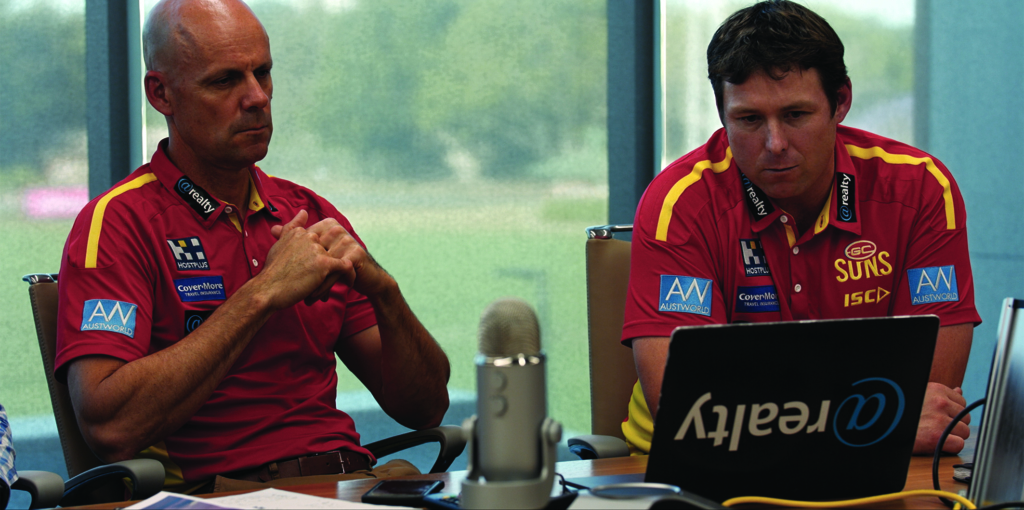
It doesn’t help that the camera rarely stays with a scene for long, nor that the fragmented coverage often plucks out and stitches together snatches of dialogue, robbing them of their natural flow. This is particularly evident in the match sequences, wherein the coaches’ responses to tactical dilemmas thrown at them in real time would’ve made for fascinating viewing. Such moments never materialise, however, because the need to condense matches into highlight packages inevitably reduces the coaches’ directives to a series of disjointed sound bites – loud, exciting sound bites, but sound bites all the same.[22]As if to address this very shortcoming, the league has released a series of videos called AFL Sound the Alarm, which observes in much greater detail the discussions from inside the coaches’ boxes during key matches from the 2019 and 2020 finals series. The 2020 grand final video appears to have been made, in part, with unused footage from Making Their Mark. See <https://www.afl.com.au/ondemand/original/501407/sound-the-alarm>, accessed 18 May 2021. As it turns out, the filmmakers have been forthright that their access to these clubs was granted on the condition that sensitive tactical information wouldn’t be exposed.[23]See ‘Making Their Mark Interview’, AFL Deep Dive, 18 March 2021, available at <https://podcasts.apple.com/us/podcast/161-making-their-mark-interview/id1354477554?i=1000513547735>, accessed 13 May 2021. This is entirely understandable but nevertheless a shame for fans like myself, because the kind of insight that Making Their Mark mostly offers is readily available through other platforms (for example, the AFL’s ever-expanding catalogue of news programs, podcasts, analysis shows and behind-the-scenes documentaries produced by its in-house media-production arm), while the series’ focus on individuals, though vaguely fascinating, is only ever of distant interest (particularly when it doesn’t concern my own team). Putting aside the issue of access, however, I still couldn’t shake the feeling that the art of football has been dumbed down, sometimes to the point of caricature. Maybe the sport is just much simpler than I realised – or maybe it’s the filmmaking that renders it so simple.
In any case, one of the more fascinating aspects of MakingTheir Mark is how it shows what words are not able to achieve. Eagles coach Adam Simpson literally snarls when he addresses his players before they take on the lowly Suns: ‘Let’s beat them up. They’re smaller than us. They’re not as experienced as us. Let’s fucking intimidate.’ All signs point to a hiding, but it’s the Eagles who end up copping it – then again in the next match, and the one after that. Coniglio likewise opens his captaincy with a personal speech to his teammates, then introduces a new pre-game ritual loaded with clunky symbolism (it involves some sort of wooden sculpture with three tubes attached, and players taking a knee in front it). It has zero effect in the long term. For all the attention Making Their Mark invests in the emotional and rhetorical gravity of words and gestures, they rarely have their intended impact. At the end of the series, what makes a team win or lose, what inspires someone to perform well or not and what determines that elusive thing that is a player’s or a team’s form remains utterly mysterious. The one reliable constant is the disconnect between cause and effect.
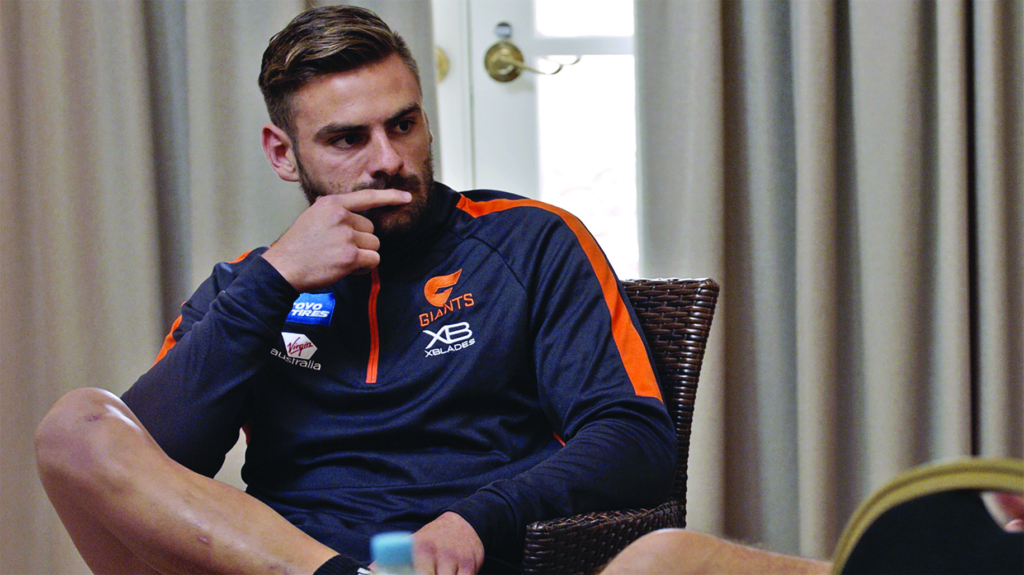
There’s a powerful exception that occurs in the final episode. Hardwick is addressing his players in the changing rooms during the half-time break of the grand final, which his side is losing. It’s as close as the series gets, as far as I can tell, to showing what great coaching looks like: simple explanations of what’s going wrong and what needs to change, and strategies distilled into a set of clear instructions understood by each and every player, all delivered in an urgent tone that’s never panicked and always encouraging. Without breaking stride, Hardwick pulls the team into a huddle and delivers a rousing finale. It’s the first time that we’re able to see a coach address his team in an uninterrupted flow. The shot holds on the back of Hardwick’s head as the players lock eyes with him, their faces just inches away from his; the camera is in the direct eyeline of a half-dozen or so players in the front row, but they don’t break gaze for a second. They aren’t just listening to him – they’re mesmerised. This is what it means for a camera to ‘disappear’ and become that fly on the wall. It’s a riveting moment of observational filmmaking that reveals a team in complete lock step with their coach. No wonder they go on to win.
Such beautiful synchronicity between the film and its subjects is, unfortunately, a rare thing in Making Their Mark. But what makes the series still worthwhile is the simple reminder, spread across its seven-plus hours, that all of these people have dedicated themselves to just one thing, which is to win the last football game of the season. The odds are, of course, unlikely. At least some of these coaches will have their jobs stripped from them prematurely, their demise fast-tracked by impatient fans and an even more impatient media. It’s poignant that a player like Betts, whom I admire both on and off the field, is more likely than not to end his career without tasting success. I’d love nothing more than for Naitanui to have a medal around his neck – but being at the ripe old age of thirty-one, he’d better get cracking. For the rest of us, there’s always next year.
Endnotes
| 1 | For McLachlan’s full remarks, see ‘AFL CEO Gillon McLachlan’s Full Statement on 17-game Season’, AFL.com.au, 16 March 2020, <https://www.afl.com.au/news/385939/afl-ceo-gillon-mclachlans-full-statement-on-17-game-season>, accessed 13 May 2021. |
|---|---|
| 2 | See Bryan Lufkin, ‘Coronavirus: The Psychology of Panic-buying’, BBC Worklife, 5 March 2020, <https://www.bbc.com/worklife/article/20200304-coronavirus-covid-19-update-why-people-are-stockpiling>, accessed 18 May 2021. |
| 3 | See ‘The AFL Has Suspended Matches Due to Coronavirus. What Does That Mean for the 2020 Season?’, ABC News, 22 March 2020, <https://www.abc.net.au/news/2020-03-22/afl-suspends-2020-season-over-coronavirus-will-it-be-cancelled/12079682>, accessed 18 May 2021. |
| 4 | The resumed AFL season revolved around flexible fixtures that could be quickly adjusted according to changes in government travel restrictions, along with the introduction of a system whereby teams would take turns relocating to quarantine ‘hubs’ set up, at various points of the season, in New South Wales, South Australia, Western Australia and Queensland. |
| 5 | Richmond won the 2019 premiership decider by 89 points, the third-biggest grand final winning margin in the league’s history. |
| 6 | Although its scope is much wider, Making Their Mark’s focus on the trials and tribulations of teams within the course of a single season is in line with previous AFL documentaries such as Year of the Dogs (Michael Cordell, 1997) and Collingwood: From the Inside Out (Josh Cable & Marcus Cobbledick, 2019). |
| 7 | Gil Marsden, in ‘Making Their Mark Director Gil Marsden (11.03.21)’, radio interview, Whateley, 11 March 2021, available at <https://www.sen.com.au/programs/whateley/>, accessed 18 May 2021. |
| 8 | See Tom Morris, ‘Giants Guarantee Axed Star Will Remain Captain … Even Though He’s Not in the Best 22’, Fox Sports, 15 September 2020, <https://www.foxsports.com.au/afl/afl-2020-stephen-coniglio-dropped-gws-giants-captain-in-2021-giants-trade-news-contracts/news-story/64cad39e5d933f62128803e084a9b342>, accessed 18 May 2021. |
| 9 | See Tyson Otto, ‘AFL 2020: Richmond’s Sydney Stack and Callum Coleman-Jones Banned for 10 Games’, News.com.au, 4 September 2020, <https://www.news.com.au/sport/afl/afl-2020-two-richmond-players-in-brawl-at-gold-coast-strip-club/news-story/994fe362f2a11f3af17348a09c47f932>, accessed 18 May 2021. |
| 10 | For more on the Carlton incident, see Daniel Cherny, ‘“Unacceptable”: Carlton Apologise After Gibbons Touches Cameraman’, The Age, 23 August 2020, <https://www.theage.com.au/sport/afl/unacceptable-carlton-apologise-after-gibbons-touches-cameraman-20200823-p55oew.html>; for the Richmond scandal, see Jon Pierik, ‘Tigers Apologise After Groping Accusation, Saint Also Sorry for Separate Incident’, The Age, 7 August 2020, <https://www.theage.com.au/sport/afl/tigers-accused-of-groping-teammate-20200807-p55jkb.html>, both accessed 13 May 2021. |
| 11 | Anecdotes about the camp, which was run by a consultancy group called Collective Mind, detailed players being subject to military-style drills and psychological abuse, as well as partaking in rituals involving the culturally offensive use of Indigenous artefacts. For an account of what allegedly occurred, see Sam McClure, ‘Inside the Camp That Brought Down the Adelaide Crows’, The Age, 4 July 2020, <https://www.theage.com.au/sport/afl/inside-the-camp-that-brought-down-the-adelaide-crows-20200630-p557od.html>, accessed 13 May 2021. |
| 12 | The AFL’s Kylie Rogers, who holds the unwieldy title of executive general manager customer and commercial, suggests that Amazon can help the league meet consumer demand for ‘sports-tainment’, and describes Making Their Mark as a ‘wonderful partnership’ with the company. See Zanda Wilson, ‘Amazon Prime’s Tyler Bern Unpacks the Platform’s Aussie Sport Strategy Ahead of New AFL Docuseries’, Mumbrella, 9 March 2021, <https://mumbrella.com.au/amazon-primes-tyler-bern-unpacks-the-platforms-aussie-sport-strategy-ahead-of-new-afl-docuseries-672474>, accessed 13 May 2021. |
| 13 | For more on these two films and the Goodes racism controversy, see Kenta McGrath, ‘Front and Centre: Two Documentaries About Adam Goodes’, 4:3, 1 November 2019, <https://fourthreefilm.com/2019/11/front-and-centre-two-documentaries-about-adam-goodes/>, accessed 13 May 2021; and Travis Johnson, ‘A Race to the Goal: Adam Goodes’ Story in The Final Quarter and The Australian Dream’, Metro, no. 203, 2020, pp. 76–83. To read the AFL’s apology, see Sarah Black, ‘AFL, Clubs Unreservedly Apologise to Goodes For Not “Standing With Him”’, AFL.com.au, 7 June 2019, <https://www.afl.com.au/news/77460/afl-clubs-unreservedly-apologise-to-goodes-for-not-standing-with-him>, accessed 13 May 2021. |
| 14 | It would have been fascinating had the filmmakers chosen to focus on the Collingwood Magpies, a club that was yet again at the centre of a racism controversy when ex-player Héritier Lumumba’s long-running accusations of racist behaviour and a culture of denial forced it to commission an independent review, headed by academics Larissa Behrendt and Lindon Coombes. The resulting report, which was leaked in February 2021, found a problem of structural systemic racism at the club; as with the Goodes controversy, the AFL’s response was subsequently called into question. See Oliver Caffrey, ‘“Shameful”: Lumumba Hits Back in AFL Racism Row’, The New Daily, 8 February 2021, <https://thenewdaily.com.au/news/national/2021/02/08/lumumba-collingwood-racism/>, accessed 19 May 2021. |
| 15 | The former figure is provided by Marsden and the latter by co–executive producer Luke Tunnecliffe. See Marsden, op. cit., and Luke Tunnecliffe, ‘Making Their Mark Executive Producer Luke Tunnecliffe on Dwayne’s World’, radio interview, SEN Afternoons, 11 March 2021, available at <https://player.whooshkaa.com/episode?id=800596>, accessed 13 May 2021. |
| 16 | Gil Marsden, quoted in Debi Enker, ‘Bubbles, Hubs and Isolation: A Chronicle of an AFL Season Like No Other’, The Sydney Morning Herald, 9 March 2021, <https://www.smh.com.au/culture/tv-and-radio/bubbles-hubs-and-isolation-a-chronicle-of-an-afl-season-like-no-other-20210305-p5786n.html>, accessed 18 May 2021. |
| 17 | Greg Baum, ‘“You Feel Like This Monster of a Person”: Unguarded Moments Caught by Amazon’s Fly on the Wall’, The Age, 9 March 2021, <https://www.theage.com.au/sport/afl/no-flyspray-allowed-for-fly-on-the-wall-doco-20210309-p5796l.html>, accessed 18 May 2021. |
| 18 | Enker, op. cit. |
| 19 | Dean Bilton, ‘Making Their Mark, Amazon’s AFL Documentary, Offers Genuine Insight into the Faults and Fears of Modern Professional Athletes’, ABC News, 16 March 2021, <https://www.abc.net.au/news/2021-03-16/making-their-mark-afl-amazon-documentary-connection/100013396>, accessed 18 May 2021. |
| 20 | Baum, op. cit. |
| 21 | Brent (Ricky Gervais) is the comitragic protagonist of the early 2000s BBC series The Office. |
| 22 | As if to address this very shortcoming, the league has released a series of videos called AFL Sound the Alarm, which observes in much greater detail the discussions from inside the coaches’ boxes during key matches from the 2019 and 2020 finals series. The 2020 grand final video appears to have been made, in part, with unused footage from Making Their Mark. See <https://www.afl.com.au/ondemand/original/501407/sound-the-alarm>, accessed 18 May 2021. |
| 23 | See ‘Making Their Mark Interview’, AFL Deep Dive, 18 March 2021, available at <https://podcasts.apple.com/us/podcast/161-making-their-mark-interview/id1354477554?i=1000513547735>, accessed 13 May 2021. |
